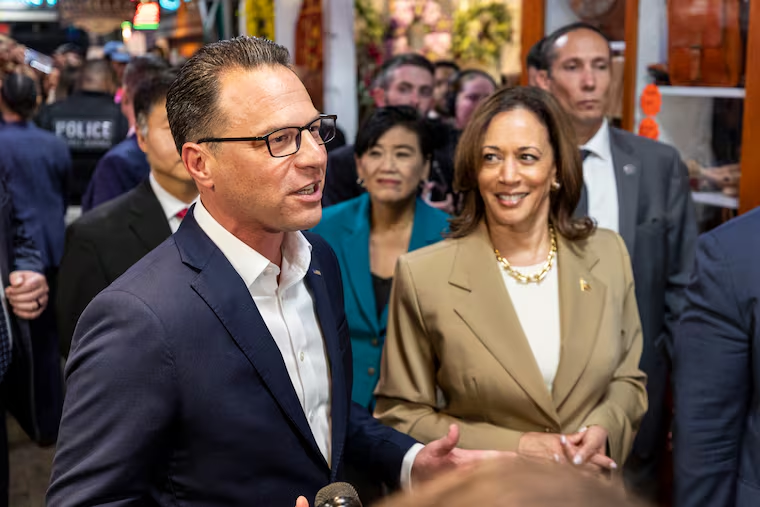Just picking Shapiro probably won’t win Pa. for Harris. Or will it?
Research shows that a VP pick doesn’t move the needle by much in their home state. But Pa. might be different.

Political science research is clear: If you’re looking to carry a state’s electoral votes, it won’t help much to pick a vice presidential candidate from there.
Unless, just maybe, the state in question is Pennsylvania, which was decided by around a percentage point in each of the last two presidential elections — and which has a parochial political culture.
Kyle Kopko, an adjunct professor of political science at Elizabethtown College in Lancaster County, knows better than most. He and Chris Devine, who teaches at the University of Dayton, have written two books on the impact that vice presidential picks have on a campaign’s fortunes, including whether the veep pick gives the ticket a home state bump.
His research suggests if Vice President Kamala Harris picks Pennsylvania Gov. Josh Shapiro, it may not move the needle much.
“We analyzed the home-state impact using a number of methods. In most cases, the result was not statistically distinguishable from zero,” Kopko said.
The reality is, while voters often say they care about VP picks, very few report that their vote choice was motivated by a vice presidential pick. Candidates’ stances on the economy and social issues matter much more than the No. 2 slot.
“At the end of the day, people are picking a candidate for president, and evaluating tickets on that basis,” Kopko said.
That’s not to say that vice presidents don’t matter at all. For one thing, there are second opinions: Political analyst Nate Silver calculates a 0.4% boost in the VP pick’s home state, which could certainly matter in a state as tight as Pennsylvania.
There is also evidence that vice presidential picks can affect the campaign in a different way, by reflecting on a candidate’s judgment or ideology. For example, Kopko’s data show that the negative media response to then-Alaska Gov. Sarah Palin dragged down perceptions of Republican nominee John McCain’s candidacy in 2008. But that effect was nationwide. It wasn’t isolated to a particular state.
Still, there are just a few cases when a local veep can make a difference. “If you have a relatively small state, and the candidate has a lot of experience representing that state, you can see a signal,” Kopko said.
Again, 2008 provides a helpful example. That year, Kopko said, then-Sen. Joe Biden really did move the needle for Democratic nominee Barack Obama’s campaign in Biden’s home state of Delaware. That’s because Biden was a particularly big fish in Delaware’s small pond, and voters there reacted with due enthusiasm for a favorite son.
There are also counterfactuals: While Obama didn’t really need Biden’s help in blue Delaware, Kopko suggested that if former Vice President Al Gore had picked then-New Hampshire governor Jeanne Shaheen in 2000, that may have been enough to deliver him New Hampshire’s electoral votes — and the presidency.
Shapiro may not be in the same category. He hasn’t been on the scene nearly as long, and in any case, Pennsylvania is a far bigger place than Delaware.
Unless Pennsylvania is a fundamentally different kind of place.
Berwood Yost, who runs the Center for Opinion Research at Franklin & Marshall College, acknowledges the soundness of Kopko’s research, but suggests another possibility.
“There’s something to be said about Pennsylvanians that they value their local communities and where they’re from,” said Yost. “They don’t say ‘I’m a Pennsylvanian.’ They’ll say ‘I’m a Pittsburgher,’ or ‘I’m from Hershey.’ And at least in primary elections, that local element definitely has an effect on the ballot.”
Yost cited a number of facts: Even in an age of nationalized politics and strong partisanship, Pennsylvanians still display a strong degree of regional loyalty when voting – perhaps not surprisingly in a state with one of the lowest rates of in- or out-migration in the country.
That local element, he suggests, may make Pennsylvanians likelier to get excited about a popular local politician, even if he’s the No. 2.
He also noted that the last time any Pennsylvania public official was nominated for vice president was in 1844.
“Pennsylvania isn’t even in Kopko’s data,” said Yost. (Kopko’s study goes back to 1884.)
Kopko acknowledged that whether or not Pennsylvania is special, there are dynamics in this election that are unique.
“More than in other years, Harris is still introducing herself as a presumptive nominee,” said Kopko. “For that reason, the introduction of the vice president could be more influential than usual in setting the tone for the Harris campaign.”
But again, that effect could be felt nationwide. Not just in Pennsylvania.
That’s not to say Kopko thinks there are no circumstances under which a Shapiro pick might matter here come November. “If we have a Florida-like situation, it could matter,” Kopko said, referencing the historically close 2000 election. “Maybe there are a few hundred people who [would have] voted for Harris because she picked Shapiro.”
Pennsylvania elections are close, but they usually aren’t usually that close. “At a margin of tens of thousands,” Kopko said, “I would doubt this is the variable that makes the difference.”